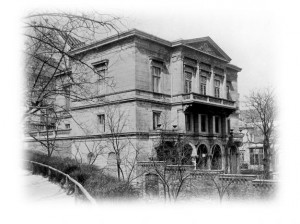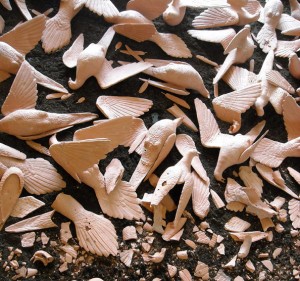Dr Titus Bánhegyi reckoned he had managed to identify the area of the brain which is responsible for sensations of emptiness and hopelessness. Or as he put it: the cerebral bump in which Nothing resides.
 There were times when furious arguments would break out even at the Villa. On one occasion the proprietor and his wife disagreed over nothing to speak of; another time the master of the house and the personnel were in dispute, and every evening there would be dissension between the personnel and the guests. One could even point to cases where virtually everyone pitched in.
There were times when furious arguments would break out even at the Villa. On one occasion the proprietor and his wife disagreed over nothing to speak of; another time the master of the house and the personnel were in dispute, and every evening there would be dissension between the personnel and the guests. One could even point to cases where virtually everyone pitched in.
It was a squabble of this kind which arose when, alongside a good few melancholy young poets, a young woman from Tihány who was sadder than them all, Angela by name, became a regular guest. So fragile a figure was she that on the reckoning of Roland Apor, a poet designate—another habituée—the Villa’s canaries would go into a flutter at her arrival for no other reason than that they were eager to get out of their cage to perch on her collarbones. Angela was a conspicuous presence not merely owing to her rococo features but also on account of her incomparably fine and profound, unbroken sadness. Not for nothing did she feel at ease in the company of the poets since they too, without exception, drank most deeply of all from the cup of despondency. Each thought his own melancholy went well together with Angela’s, whereas Angela would have much rather been freed of low spirits than have them matched with someone else’s. As no-one understood that—at least none of the poets—Angela grew sadder by the day.
During the same period of time a frequent visitor at the Villa was a distinguished surgeon by the name of Dr Titus Bánhegyi, who was widely known throughout Europe as a brain researcher. He had little in the way of companionship, or to the extent that he did it was some colleague or other, either a neurosurgeon or a pathologist. Esteemed at every hand he might be, nevertheless it was feared that he engaged daily in digging around in skulls. He personally was aware of this ambiguous status, declaring on one occasion:
“Anyone who occupies himself with the demented can easily go mad himself.”
On another occasion he asserted:
“The only person as mad as me in this city is a hatter. Like me, he also does nothing but measure heads from one end of the day to the other.”
Even such self-ironical comments were unable to dispel the idea that not only was the professor’s profession upsetting, but also his very odour. Not as bad as the pathologist’s, true, but hardly any better.
Dr Titus Bánhegyi reckoned he had managed to identify the area of the brain which is responsible for sensations of emptiness and hopelessness. Or as he put it: the cerebral bump in which Nothing resides. As a result of that knowledge, the insipid professor became a fundamentally optimistic character, unlike incessantly gloomy Roland Apor. Nor would there have been any trouble had the professor not got into conversation with the poets. Needless to say, from the very outset, a vigorous dispute grew up between the professor and the lyricists, with the latter feeling it to be extraordinarily derogatory that their perpetually tragic view of the world could be ascribed to a cerebral bump.
“It makes a mockery of the sentiments,” exclaimed Hyacinth Németh before quitting the coffee room for that day.
Perhaps it was precisely these heated reactions which prompted the professor to renewed cogitation as to what it was which had caused him to decide he would be able to select the most suitable experimental subjects from their ranks. The sort of individual in whom some sort of hopeless longing, or in other words the bump of Nothingness, was more strongly present than in anyone else. A few disputes were enough for Dr Titus Bánhegyi to single out Angela as the first subject for the experimental surgery in the process of which he would remove the bump in question. She, from the very beginning of the arguments between the professor and the poets, had adopted an intermediate position, leaning first one way then the other, declaring on one occasion:
“In point of fact I shall not rule out the possibility if it genuinely helps.”
On that issue not only Angela but also the argument became unmanageable. Everyone, from Cuno on through the owner of the house down to the very last guest, was utterly against the professor and tried to induce Angela to think better of it. Angela, for her part, grew more obdurate the harder people tried to persuade her. The anti-operation camp split into several factions, each blaming the others for the failure: the poets blaming Cuno; Cuno—the patisserie girl for an ill-judged statement; the patisserie girl—the weather; and the proprietor—“the whole kit and caboodle.” In the end, Angela, fed up of the constant skirmishing around her, one day, without further ado, marched into the professor’s department to be the first in the world to have the so-called “Bánhegyi fragment” resected by the revolutionary operation.
Around Advent, Angela, wearing her usual thin, pale-blue tulle skirt despite the freezing, windy weather, put in an appearance at the Villa Bagatelle. The poets, who were moping more mournfully than ever before, greeted her with exuberant clamour, yet Angela, while showing not the slightest sign of melancholy, remained undemonstrative.
“I came to say farewell,” she announced, hovering somewhat flummoxed in front of the winter garden.
“Miss Angela, at least join us as a guest for a cup of tea,” Cuno enjoined, taking a seat from another table and setting it down with the party round Roland Apor’s table.
Angela seated herself on the chair.
“So, how did the operation work out?” Hyacinth Németh asked in cadences sceptically inflected as ever.
“It worked superbly, which is precisely the reason why I’ve come,” Angela kicked off. “There is no longer any sadness in me, and I cannot understand why I ever perceived the world as being so bleak and beyond all hope. I am no longer plagued by unattainable hankerings, a sense of lacking fulfilment. I want to live, can you understand? Simply to live, with or without someone else, that’s no matter, the world is wonderful, exciting, colourful—that’s exactly why I want to see everything there is to see. That is why I am setting off on my travels, touring all over Europe, the high seas and overseas, and if I ever get back it will be a very long time from now, but I did not want to depart without a word of farewell, seeing as how I have spent a fair amount of time here,” Angela enthused, and indeed she thrilled with a fire of which earlier there had not been so much a flicker.
For a moment even the flashes of seed in the beaks of the seed-cracking canaries halted. Roland Apor, in contrast, was preparing to utter what were evidently some churlish words of disparagement, but Cuno stepped in:
“It’s a treat to see you, dear Miss Angela, a treat for all of us to see you so full of joie de vivre and perfectly all right.,” Cuno hastily averred, though the poets’ hostile mood had not lessened a jot, so he added jocularly:
“If a time should come when moroseness gains a hold over me too, and I don’t have to pay the cost, maybe I too will submit to the professor’s scalpel.”
The poets saw neither point nor purpose to the pun. They switched their gazes indignantly to Cuno while Angela calling to mind, for the first time, something of her old melancholy, turned a trifle sadly to him:
“I’m sorry to say that it will no longer be possible to submit yourself to the professor’s scalpel.”
“Why ever not?”
“Did you not read what happened?”
*
After the operation Dr Titus Bánhegyi had vanished without a trace, and not just him but his assistants, two medical students, and the anaesthetist as well—twelve altogether who had all been in the operating theatre. All the people who knew exactly where on the brain that bump was. More than likely they were swallowed up by what had, until then, been residing in me. That triviality, that Nothing.





